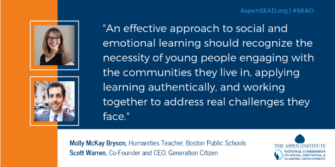By Molly McKay Bryson and Scott Warren
For too long, civics has been completely marginalized in school curriculum. When it is taught, in many places, civics means reading about and memorizing labyrinthine power structures or abstract concepts. Sometimes students are invited to analyze them, but rarely to participate. It is not surprising that democracy often then feels distant, ineffectual, and irrelevant to students’ lives.
This focus on rote knowledge is damaging, and not just because it frequently leads to disengaging pedagogy and missed opportunities for deeper learning. Inactive civics education leaves many of us disinterested in, or alienated from, a political system that we are taught we need to fit into. Politics becomes a stagnant exercise, rather than a vibrant practice we can use to strengthen our communities and to shape larger systems to meet our needs.
At Generation Citizen, we promote a discipline we call Action Civics: students learn politics by doing politics. Through a rigorous, interdisciplinary process, students choose a local issue they care about, and then take concrete action, largely at the local governmental level. Through Generation Citizen, young people have addressed homelessness in the Bay Area by successfully advocating for opening a year-round youth shelter; teacher pay in Oklahoma by lobbying their state legislators; and the opioid crisis in Staten Island by advocating for needle dispensaries. Ideally, civics becomes the most exciting and relevant class in school, rather than a slog of memorization.
This emphasis on active participation in the political system can lead us to traditional academic outcomes, like understanding the systems and players in existing political structures, but it also pushes toward more meaningful and lasting learning. Action Civics allows young people to authentically apply what they’re learning, reflect on that process, and revise action after analyzing their results against their goal. Not only does this type of experiential learning provide opportunities for more rigorous academic learning, but it also opens the door to building social and emotional skills.

Last spring, a group of high school seniors in Boston decided to focus on increasing student voice in school discipline. However, after looking further into the broad debate around including students in discipline practices, they were hotly divided between two possible methods of addressing the issue.
“We’re never going to be able to agree!” one student exclaimed after a day of discussion didn’t end in consensus.
But the following day, they started class by reading excerpts of their self-reflections about the dynamics of their disagreement and what it would take to move the group forward. Encouraged by one student’s reflection, they decided they needed to reach out to the Boston Student Advisory Council to learn more context from youth who’d been organizing around related issues for years. By the end of that meeting, the class unanimously agreed that, while both worthy, only one of their proposed goals was achievable before they graduated.
Through a traditional lens for civics education, those two days might have been seen as an inefficient use of time. Shouldn’t the adult have just made the decision so they could move on to the next day’s objective? Shouldn’t students just have learned about the systems at hand?
But, that messy, responsive, and eventually fruitful process is actually the point.
The struggle, reflection, and revision inevitable in truly democratic decision-making offers embedded and explicit opportunities for cultivating social and emotional skills such as self-reflection, social awareness, and responsible decision-making; skills that are then vital to success beyond school, in life, and in a democracy.
Building consensus is just one of those opportunities. Social and emotional learning and Action Civics are not just compatible, they are necessary and interdependent academic complements.
An effective civics education needs to promote young people’s social, emotional, and academic development. At the same time, an effective approach to social and emotional learning should recognize the necessity of young people engaging with the communities they live in, applying learning authentically, and working together to address real challenges they face. The synergy between social and emotional learning and civics can help us to envision and build the healthier, more accessible, and more active democracy we all crave in this current moment.
Molly McKay Bryson is a humanities teacher and SEL instructional coach in Boston Public Schools. She serves on Generation Citizen’s inaugural Teacher Leadership Board. Scott Warren is the co-founder and CEO of Generation Citizen, a national Action Civics education organization based in New York City, operating throughout the country.